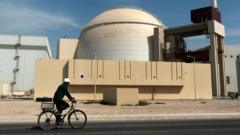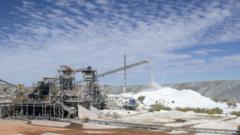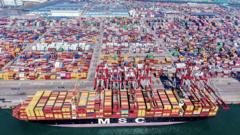As US and Iranian officials seek to renegotiate terms around Iran's nuclear activities, the stakes are high amid fears of military conflict, skepticism from international watchdogs, and the undercurrents of regional geopolitics.**
Tensions Rise Over Iran's Nuclear Ambitions Amid US Diplomatic Efforts**

Tensions Rise Over Iran's Nuclear Ambitions Amid US Diplomatic Efforts**
Ongoing indirect talks in Muscat aim to address concerns over Iran's nuclear program, following the US exit from the JCPOA and increasing military threats from Washington.**
Ongoing indirect talks in Oman’s capital, Muscat, have seen US and Iranian officials attempt to broker a new deal regarding Iran’s contentious nuclear program, a subject of international concern since the US withdrew from the Joint Comprehensive Plan of Action (JCPOA) in 2018. The unilateral withdrawal by former President Donald Trump, followed by the reinstatement of stringent economic sanctions, has heightened tensions and led Iran to breach several key commitments initially outlined in the nuclear agreement.
Although Iran asserts that its nuclear program is for civilian use, fears abound internationally regarding its intention to develop nuclear weapons. The country's clandestine nuclear facilities unearthed in 2002 raised further suspicion, thereby undermining trust in its claims. The Nuclear Non-Proliferation Treaty (NPT), which Iran has signed, allows the use of nuclear technology for peaceable purposes, but prohibits the development of nuclear arms.
The current state of affairs indicates that Iran may possess around 275kg of enriched uranium at 60%, just a step below the 90% purity required for weapons-grade material. US intelligence suggests that Iran could construct a nuclear weapon within a timespan of one to eighteen months. Consequently, Trump has framed the situation in stark terms, indicating a willingness to use military action should negotiations falter.
The previous sanctions devastated Iran's economy, restricting oil exports and freezing substantial foreign assets. While the JCPOA provided a framework to ease these sanctions in exchange for compliance with nuclear restrictions, the US's withdrawal drastically shifted the landscape, prompting Iran to increase its enrichment activities.
As the US seeks to navigate this tense environment, key figures—like Israel's Prime Minister Benjamin Netanyahu—advocate for a complete dismantlement of Iran's nuclear capabilities, emphasizing that any agreement falling short of this would be unacceptable. Israel, suspected to possess nuclear weapons itself, views an armed Iran as a direct threat given Tehran's stance toward the Jewish state.
In light of this backdrop, the complexity of a potential military strike against Iran cannot be understated. Both the US and Israel have the military tools necessary to target Iran’s nuclear installations, but execution could provoke a broader regional conflict. The risks involved require careful consideration of military logistics, including potential retaliation from Iran and the willingness of regional allies to support such actions.
As the world watches closely, the evolving dynamics between the US, Iran, and its allies will substantially shape the path forward for regional security and nuclear non-proliferation efforts.






















